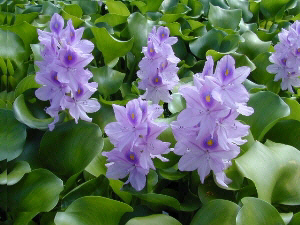 Water gardening is easy with floating plants. Just place in the water and they drift effortlessly in your pond. The roots of floating plants dangle down into the water where they draw nutrients for the plant's growth. Floating plants provide shade for your pond while creating a place for fish to hide under to protect them from the hot summer sun. They also give them a place to hide from predators, such as herons or raccoons. The greatest benefit of floating plants is they help with your ponds filtration.
Water gardening is easy with floating plants. Just place in the water and they drift effortlessly in your pond. The roots of floating plants dangle down into the water where they draw nutrients for the plant's growth. Floating plants provide shade for your pond while creating a place for fish to hide under to protect them from the hot summer sun. They also give them a place to hide from predators, such as herons or raccoons. The greatest benefit of floating plants is they help with your ponds filtration.
Some of the floating plants, such as water lettuce, water hyacinth and parrots feather are good for filtrating. Their tiny hairy roots absorb nitrates and phosphates from the water and help in creating a good filtration. By taking these nutrients in it prohibits algae growth and green water. Azolla and duckweed are also filtration plants. Your other floating plants, such as sensitive plant and frogbit will only filter nutrients from the water and don't help combat green water.
Remember not to place floating water plants in your pond until the water temperature have reached 65 degrees. They will show signs of yellowing leaves and black spots on their leaves if left in water temps below that. We tend to get anxious in the spring and sometimes put floaters in before the water is warm enough.
If you want to try and keep them over the winter you may try floating them in a tray or aquarium. Its difficult and not always successful but worth a try if you so desire. You need to keep the water around 70 degrees and they need about 12-14 hours of sunlight. With it being hard to get that much sunlight during the months of January and February you would have to keep a growing light on them about 12 inches over the water. You may find that its cheaper just to replace them yearly due to the cost of energy and electricity required to keep them growing over the winter.
Caring for these plants is minimal and a great asset for your pond. Some states discouraged or even ban them from possession due to their growth rate and spreading rate. You should never add to a natural body of water. If you aren't sure about your area make sure you compost them into your vegetable bed. You can always check with your state regarding the laws that prohibit these plants.